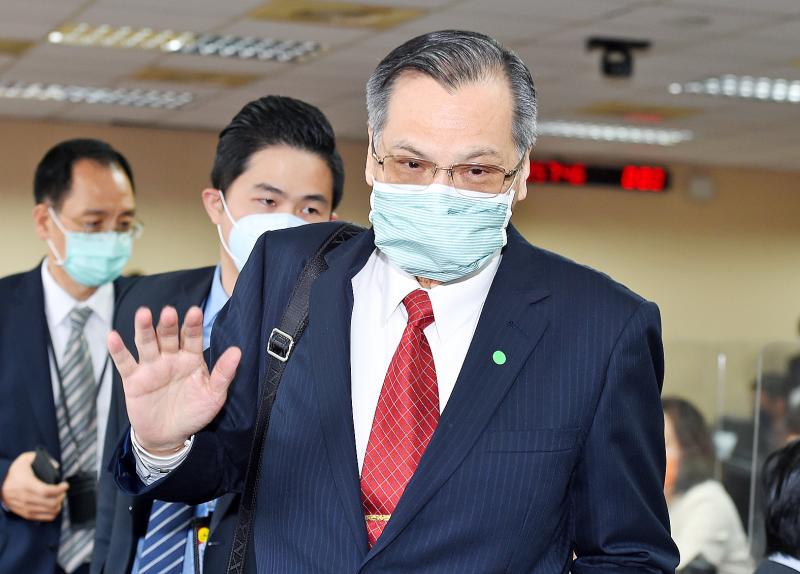The nation’s intelligence chief yesterday said that some local Internet celebrities are being paid by the Chinese Communist Party (CCP) to conduct “cognitive warfare” campaigns in Taiwan and help Beijing spread propaganda.
National Security Bureau (NSB) Director-General Chen Ming-tong (陳明通) said that one example happened in early March following Russia’s invasion of Ukraine, when a Taiwanese Internet celebrity on TikTok claimed that the Chinese government was offering to evacuate Taiwanese from the European nation.
The NSB later found that the TikTok celebrity was not in Ukraine, but based in the Chinese city of Hangzhou, Chen said, adding that the person had been trained by the CCP to use social media to spread propaganda as part of its “united front” efforts.

Photo: Liao Chen-huei, Taipei Times
The NSB has a full grasp on such “cognitive warfare” campaigns, and related authorities are investigating, Chen said, without elaborating.
Chen made the comments at the legislature in Taipei in response to a report in the Taipei Times and the Chinese-language Liberty Times (the sister newspaper of the Taipei Times) that Beijing has been training and paying Taiwanese to influence young Taiwanese on media platforms such as YouTube, TikTok and Little Red Book, also known as Xiaohongshu, the Chinese equivalent of Instagram.
A number of high-profile Taiwanese YouTube celebrities based in China attended the fifth Cross-Strait Youth Development Forum in Hangzhou, China, on Wednesday, during which they shared their successes in running their social media platforms while encouraging more young Taiwanese to join them, the report said.
The report quoted Democratic Progressive Party lawmakers, who called on the government to come up with measures to counter China’s use of Taiwanese Internet celebrities to conduct “cognitive warfare” against young Taiwanese.
The forum was joined by about 450 guests and youth representatives from both sides of the Taiwan Strait, including former Chinese Nationalist Party (KMT) chairwoman Hung Hsiu-chu (洪秀柱), Chinese media reports said.

INVESTIGATION: The case is the latest instance of a DPP figure being implicated in an espionage network accused of allegedly leaking information to Chinese intelligence Democratic Progressive Party (DPP) member Ho Jen-chieh (何仁傑) was detained and held incommunicado yesterday on suspicion of spying for China during his tenure as assistant to then-minister of foreign affairs Joseph Wu (吳釗燮). The Taipei District Prosecutors’ Office said Ho was implicated during its investigation into alleged spying activities by former Presidential Office consultant Wu Shang-yu (吳尚雨). Prosecutors said there is reason to believe Ho breached the National Security Act (國家安全法) by leaking classified Ministry of Foreign Affairs information to Chinese intelligence. Following interrogation, prosecutors petitioned the Taipei District Court to detain Ho, citing concerns over potential collusion or tampering of evidence. The

‘FORM OF PROTEST’: The German Institute Taipei said it was ‘shocked’ to see Nazi symbolism used in connection with political aims as it condemned the incident Sung Chien-liang (宋建樑), who led efforts to recall Democratic Progressive Party (DPP) Legislator Lee Kun-cheng (李坤城), was released on bail of NT$80,000 yesterday amid an outcry over a Nazi armband he wore to questioning the night before. Sung arrived at the New Taipei City District Prosecutors’ Office for questioning in a recall petition forgery case on Tuesday night wearing a red armband bearing a swastika, carrying a copy of Adolf Hitler’s Mein Kampf and giving a Nazi salute. Sung left the building at 1:15am without the armband and apparently covering the book with a coat. This is a serious international scandal and Chinese

Seventy percent of middle and elementary schools now conduct English classes entirely in English, the Ministry of Education said, as it encourages schools nationwide to adopt this practice Minister of Education (MOE) Cheng Ying-yao (鄭英耀) is scheduled to present a report on the government’s bilingual education policy to the Legislative Yuan’s Education and Culture Committee today. The report would outline strategies aimed at expanding access to education, reducing regional disparities and improving talent cultivation. Implementation of bilingual education policies has varied across local governments, occasionally drawing public criticism. For example, some schools have required teachers of non-English subjects to pass English proficiency

TRADE: The premier pledged safeguards on ‘Made in Taiwan’ labeling, anti-dumping measures and stricter export controls to strengthen its position in trade talks Products labeled “made in Taiwan” must be genuinely made in Taiwan, Premier Cho Jung-tai (卓榮泰) said yesterday, vowing to enforce strict safeguards against “origin laundering” and initiate anti-dumping investigations to prevent China dumping its products in Taiwan. Cho made the remarks in a discussion session with representatives from industries in Kaohsiung. In response to the US government’s recent announcement of “reciprocal” tariffs on its trading partners, President William Lai (賴清德) and Cho last week began a series of consultations with industry leaders nationwide to gather feedback and address concerns. Taiwanese and US officials held a videoconference on Friday evening to discuss the